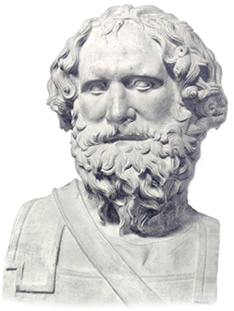...Best of Sicily presents... Best of Sicily Magazine. ... Dedicated to Sicilian art, culture, history, people, places and all things Sicilian. |
by Ignazio Lo Verde | |||
Magazine Index Best of Sicily Arts & Culture Fashion Food & Wine History & Society About Us Travel Faqs Contact Map of Sicily
|
The family's inbreeding merits explanation. Hipparinus was a statesman who supported the army of Dionysius I. Hipparinus' daughter, Aristomache, wed Dionysius I. However, his heir Dionysius II "the Younger" was the son of Doris, another wife of Dionysius. Aristomache's daughter, Sophrosyne, married Dionysius II and Arete wed Dion. Dion was an ambassador and negotiated with Carthage. He was also influential in convincing Plato, under whom he had studied in Athens, to come to Syracuse, though the two eventually parted ways when Plato criticised tyrants, thus offending Dion as well as Dionysius. Upon the death of Dionysius I, his son was ill unprepared to succeed him, yet he did, and came to resent Dion's influence in the city and beyond. Plato returned to Sicily in 367 BC but his presence did little to improve matters. Soon the ever-jealous Dionysius had Don arrested and exiled to Greece, and for a time prevented Plato from leaving Syracuse. He did leave and then returned to Sicily for a third time. The fickle Dionysius ruled unopposed until Dion arrived with a substantial military force while the former was away in peninsular Italy. Though he conquered the city, a series of vicissitudes led to a succession of intrigues and battles until 357 BC. It seemed that there were rumours and conspiracies everywhere. Calippus the Athenian, though supposedly loyal to Dion, accepted a bribe from Dionysus to assassinate him. With the help of other traitors, he succeeded in doing so in 354. Dion's beloved mentor, Plato, outlived him, dying in 347. If the pragmatic yet idealistic Dion has any lasting legacy, it was his attempt to bring true democracy to Syracuse. Sadly, his efforts were sorely misplaced, directed to helping an unappreciative population. His tragic life reminds us that in Sicily, with its corrupt politics and other crippling social ills, little among the common people" has changed substantively in all these centuries.
About the Author: Ignazio Lo Verde lectures on Greek classics and other subjects. | ||
Top of Page |
 Dion of
Dion of